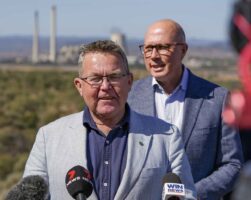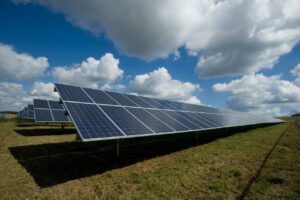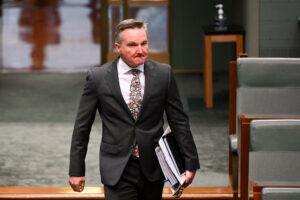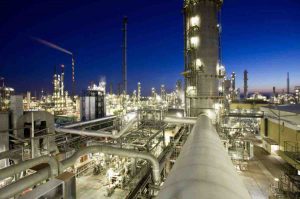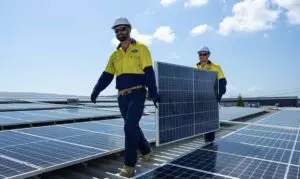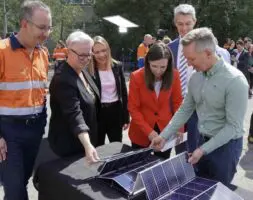If you want to understand the nature of Australia’s energy crisis right now, look beyond the headlines and the rhetoric from both sides off the fossil fuel fence, and just take a look at market prices.
Australian consumers – both big and small – are being ripped off at the petrol pump, at the power socket, and the gas pipelines by a massive industry used to setting its own rules and regulations, and having its own way with markets and governments.
Australia has no shortage of gas, that much is now clearly well established. But what should also be recognised is that it has no shortage of gas cartel like behaviour, even if the country’s impotent regulators prefer to look the other way.
On Monday, something extraordinary happened. On the same day that the Australian government finally dared to call its bluff, and threaten the imposition of the so-called “gas trigger”, prices plunged on both the electricity futures market and the gas market.
It was as if the fossil fuel industry had been caught red handed, like a trillion dollar toddler with its hand in the cookie jar, its pockets full of sugary sweets and its mouth bursting with lollies as it protested its innocence. It insists, always, that it only ever has the consumer at heart.
Gas prices plunged in Victoria – from around $30 a gigajoule to just $12, and in NSW from $30 to $20, with predictions of further falls to match the Victoria price.
In the electricity market, the futures price for “baseload” contacts in multiple markets did a rapid about turn, plunging more than $15/MWh in one day.
Coincidence? The industry points to lower demand and the return of coal generators as factors, but those didn’t happen on Monday afternoon. If anything, it reinforces the view that prices are kept higher than they should be.
Try as they might, the regulators have struggled to find any evidence of gaming, just of perfectly legal “re-bidding”. The industry has even evolved its own vocabulary – opportunistic cost, for instance – to assign some sort of economic rationale, if not moral justification, for the exploitation of consumers.
As energy analyst Dylan McConnell noted this week, the spectacular price falls “belled the cat” on the fact that Australian gas producers, and many other parts of the industry, have been enjoying windfall profits at the expense of consumers, and justifying it by pointing to international prices.
It’s a story, as we have noted, of a fossil fuel industry that has lost all perspective, and has effectively thrown away its social licence. But still it craves more money and regulatory indulgence.
Bruce Robertson, an energy finance analyst from the Institute for Energy Economics and Financial Analysis, says the report from the Australian Competition and Consumer Commission that attracted so much attention on Monday has confirmed there is no shortage of gas in Australia.
“This is a contrived shortfall. It doesn’t exist. There is an abundance of gas – an embarrassment of riches – on the east coast of Australia,” he told RenewEconomy.
“What’s happening is that these companies are just starving the market of gas. It’s what they’ve been doing consistently since 2015.”
Robertson says the east coast gas market has all of the features of a cartel, in that just a few companies control 90% of the supply, they have been reported to be using anti-competitive practices, and they are forcing prices up above international levels.
“What the ACCC report actually outlines is that there’s a gas cartel operating… the report forensically details all of those three things, and yet it doesn’t call them a cartel.
“We have all these things happening, and yet they won’t actually call it what in economic terms it is: a cartel.”
The clean energy industry has been able to launch a few devastatingly effective raids on the gas cartels so far.
The most notable is perhaps the influence of the original Tesla big battery in South Australia that broke the cartel that had been openly rorting frequency markets by making all but 1MW of supply available at low prices, and then charging a fortune for the remaining MW that flowed through to the entire market.
The petrol market is another case in point. The previous federal government slashed the fuel excise in half, and is now arguing that it be extended to protect consumers. The refiners, meanwhile, are making off with huge margins and profit lifts.
Wind and solar can sometimes break the control of the fossil fuel generators when they produce enough to that they become the price setters, not coal, gas or hydro.
So can other technologies such as demand response, but the incumbent fossil fuel industry has fought such initiatives, including energy efficiency, with tooth and nail.
In the last two months, under the cover of international prices spikes, the legacy industry – largely but not exclusively fossil fuels – has been able to do what it wants, except when it went too far and forced the market operator to suspend the market.
In the UK, the government and the regulator are sick of it, and are now seeking to design new markets that will ensure that the low price of wind, solar and storage is not polluted by the cartel-like practices of the fossil fuel industry.
Robertson says the Australian federal government and the regulators need to take stronger action and be smarter about the problem at hand, which means thinking of alternatives like efficiency and regulation rather than just supply.
“The idea that you can chat to these companies and ask them to play nicely is off with the pixies,” he says.
“The same applies to the idea that we can produce more gas and it will reduce prices. We’ve tried that time and time and time again over the last six years and it doesn’t work. We need to get a grip and do something that will work.
“Cartels are illegal. Price fixing is illegal… What we have is a government that is cow-towing to an illegal price fixing organisation to the detriment of the Australian people.”
Robertson also suggests that the developers of the massive and duplicated LNG terminals around Gladstone in Queensland are breaking the approval conditions for their projects, which essentially was a guarantee that export activities would not impact the domestic market.
“We also have a government that is refusing to enforce the rules under which those conditions were made. They’ve had an immense effect on prices and in many cases pushed them above international prices.
“Someone has got to call it out for what it is: obscene. We’re being held for ransom by a cartel and the government refuses to prosecute.”
Many analysts suggest a windfall tax to ensure Australian consumers get some benefit from the massive profits being earned by the gas industry and the fossil fuel industry in general.
Robertson’s preferred solution is domestic gas reservation on all fields, and forcing the price down to a similar level of Western Australia.
“This has to end – we’ll see massive job losses and genuine hardship for anyone who is not well off if we don’t do something. It’s not hard to do, it’s called legislation it’s called government policy.
“We need to do it now. Like literally today, we need to start drawing up this legislation and get it happening. Get a domestic gas reservation that sets aside more than what we need.”
We need more than that.
Greens Senator Sarah Hanson-Young on Tuesday noted the energy system, as it stands, is obviously broken.
“These big gas companies have been ripping off customers, consumers, households and small businesses for far too long
“They’re making windfall profits. They’re not paying enough tax. And they’re taking Australians for a ride. There is no shortage of gas here in Australia. We’ve got plenty of it.”
But Hanson-Young says rather than green-lighting yet more gas and coal projects, “one of the things we’ve got to really do is fast track the transition … of our energy grid making sure we have it powered by renewables and storage. That would make cheaper, more reliable power and push down prices very, very quickly.”
The NSW Coalition government gets it. Industry gets it. Investors get it. Consumers get it. Why doesn’t the federal government get it?
See also: “Exciting and pivotal moment:” NSW prepares for big switch from coal to renewables



